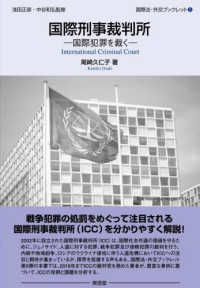- ホーム
- > 洋書
- > ドイツ書
- > Mathematics, Sciences & Technology
- > Technology
- > electronics, electrical engineering, telecommunications
Full Description
The book provides a holistic review, presenting a multi-stakeholder, multi-disciplinary, international, and evidence-based approach to Information and Communications Technology (ICT) in migration. The book brings together different views and multifaceted responses to ICT-based migration management, examining their overlap, conflict, and synergies. The book is a major addition to the field, tackling important debates concerning humanitarianism and securitization in the reception of migrants, as well as exploring the role of digital technology in aiding migrant integration. The authors explore contentious areas such as the use of new technologies deployed on borders for migration management and border security under the umbrella of smart border solutions including drones, AI algorithms, and face recognition, which are widely criticized for ignoring the fundamental human rights of migrants. The research presented will depart from the euphoric appraisals that technology has made thingseasier for migrants and those who assist them, to critically examine the bane and boon, benefits and afflictions, highlighting the barriers, as well as the solutions, including several under-researched aspects of digital surveillance and the digital divide.
This edited volume has been developed by the MIICT project, funded under the EU Horizon 2020 Action and Innovation programme, under grant agreement No 822380.
Provides a positive approach to the integration of migrants, asylum seekers, and refugees using Information and Communications Technology (ICT) solutions
Offers a strategic approach to providing digital services for migrants at an EU, national and local level
Bridges the gap between academia and front-line practitioners' work by providing theoretical, policy, ethical, and methodological recommendations
Contents
Introduction.- Part 1 - The relevance of ICTs in migration.- Minority rights.- Migration knowledge production and the shaping of perceptions of Europe.- Integrate services to integrate migrants.- Part 2 - Reviewing perspectives and experiences.- The Challenges and opportunities of ICT along the Road to Europe.- From a digital breach to a usage and positioning gap.- Developing migration focused ICT tools with marginalised groups.- ICTs and Migration.- The Challenges of co-design and co-creation for migrant integration.- Easing migrants' access to public services.- Part 3 - Developing migration-related ICTs.- Micado Architecture.- The challenges of co-creation processes on developing ICT solutions for migrant inclusion.- Experiences from the development of ICT tools for and with migrants through NADINE platform.- Equity, Diversity and Inclusion in designing AI-based solutions for migrants integration: REBUILD project.- Skill matching for migrant guidance based on AI tools.- Personalisedinteraction or how we can improve migrants' experience when using a digital companion through a mobile app.- Immerse Architecture.- Authoring tools for young migrants.- Part 4 - Legal, ethical and societal considerations.- Assessing the socio-economic, technological and political impact of ICT tools for migrant integration.- Protecting Migrants' Data.- Shaping ICT policies for integrative and inclusive digital services.- Legal and Ethical Frameworks Applicable to Social Media Analytics in the Context of Migration.- The Legal Framework Applicable to the Design and Use of ICTs in Migrants' Integration.- Conclusion.

![L'islande Et L'archipel Des FÃ]rÅ"er](../images/goods/../parts/goods-list/no-phooto.jpg)






